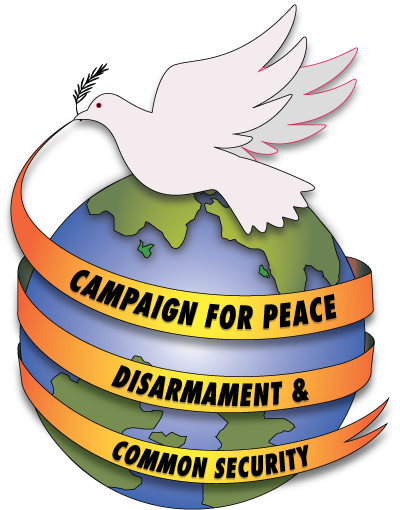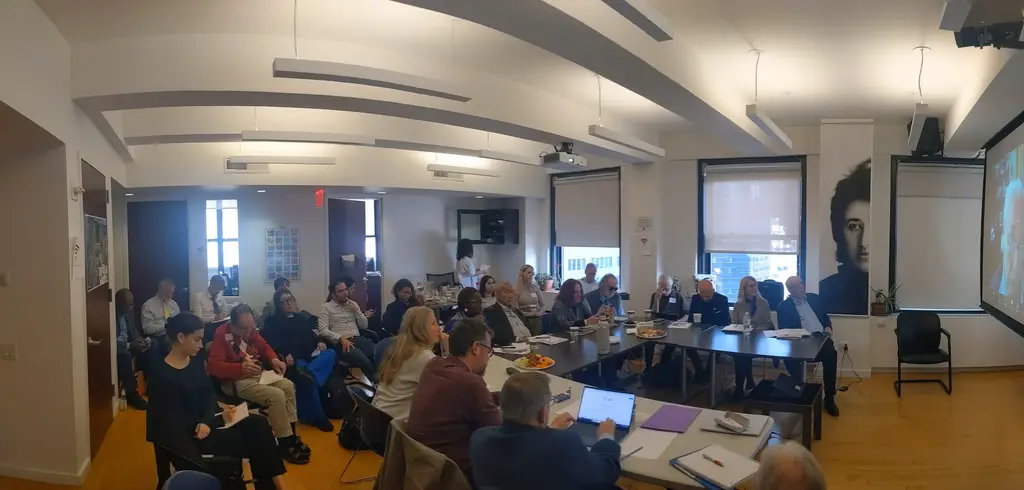International Round Table: Nuclear Weapons and Tectonic Geopolitical Change, 28 November 2023.
For the global union movement, peace is not just a checkbox on our agenda; peace is built at the very core of our mission. Examine union constitutions and you will find in the early sentences a resolute commitment to peace — not just an opposition to war, but against weapons of mass destruction, against militarisation, against the war mongers.
The ITUC Constitution says the following: “The Confederation upholds fervently the maintenance and strengthening of peace and commits itself to a world free of weapons of mass destruction and to general disarmament. It proclaims the right of all peoples to self-determination and to live free from aggression and totalitarianism under a government of their own choosing. It rejects recourse to war to resolve conflict, and condemns terrorism, colonialism and militarism, as well as racism and sexism.”
For unions, peace isn’t merely the absence of conflict. It’s a comprehensive dedication, a philosophy that guides our policies and, more importantly, our actions. With the ongoing conflict in Ukraine and Palestine and an array of global challenges, it is more important than ever to revisit the foundational values of the labour movement and bring new life into our vision of peace.
If we research the history of unions, we find a rich legacy of peace activism. From demonstrations and strikes to campaigns for disarmament and development, unions have been at the forefront.
One example of the legacy of peace activism would be the Swedish trade union movement as the unifying force were its solidarity work and protests against the fascism in Spain made a difference for many. Among the work done by unionists, the Typographic Union granted an office for the Aid Committee for Spain, 5000 SKR was donated by the Swedish Social democrats to the International Solidarity Fund and LO contributed with 50 000 SKR and encouraged their affiliated to do the same.
In our present landscape, we confront existential threats such as nuclear risks, climate upheaval, and pandemics. On top of these existential challenges there are also enormous societal issues — inequality, extremism, nationalism, gender violence, and a diminishing democratic space. How we collectively respond to these challenges will shape our collective future.
The global union movement, represented internationally by the ITUC, stands as a formidable force. We are not just organisations; we are practitioners of peace, embodying solidarity daily in the pursuit of human security.
But this commitment to peace faces challenges — a war on multiple fronts against union principles. The impediments to union registration, violations of the right to strike and collective bargaining, and the exclusion of workers from union formation are stark realities. Conflicts in Belarus and Myanmar exemplify the adversities that workers have to stand against. But we also see that in Europe and in the Americas, peace and social justice are being questioned by the rise of the Far-Right
We are facing a crossroad with an important choice to make —an existence based on confrontation and aggression or one to be rooted in a transformative peace agenda and common security. Today our common systems and structures are inadequate and frequently ignored or violated. Our common systems and structures are needed to provide security, combat poverty and inequality and prevent human suffering
The Common Security report is a strategic guide for navigating this chaos. With the conflicts in Ukraine and Palestine and global military expenditures soaring, the report urges a recalibration of policies. It’s not just about the war, it’s about devising new responses to pressing global issues.
When the original report was published in 1982, by our former Prime Minister Olof Palme, superpower relations were at rock bottom, their armies faced and threatened each other, the risk of nuclear war was imminent. And the original report concluded: “International security must rest on a commitment to joint survival rather than a threat of mutual destruction”.
In the new report we set out a vision for a better world to revitalise the idea of Common Security in doing so we make a series of recommendations focused on four main areas:
1. Strengthen the global architecture for peace
2. A new peace dividend for disarmament and development
3. Revitalised Nuclear Arms control and disarmament
4. New military technologies and outer space weapons
The new report also sets out six principles for common global security:
1. All people have the right to human security: freedom from fear and freedom from want.
2. Building trust between nations and peoples is fundamental to peaceful and sustainable human existence.
3. There can be no common security without nuclear disarmament, strong limitations on conventional weapons and reduced military expenditure.
4. Global and regional cooperation, multilateralism and the rule of law are crucial to tackling many of the world’s challenges.
5. Dialogue, conflict prevention and confidence-building measures must replace aggression and military force as a means of resolving disputes.
6. Better regulation, international law and responsible governance also need to be extended to cover new military technologies, such as in the realms of cyberspace, outer space and “artificial intelligence”.
Besides the new Common Security report, trade unions also recall the importance of ILO Recommendation 205, on Employment and Decent Work for Peace and Resilience, that came into force in 2017 after an decisive contribution from the labour movement.
The ILO recommendation recognises that peace is not merely the absence of conflict but involves addressing the root causes of violence and instability. It emphasises the need for a comprehensive and integrated approach to peace-building.
By promoting decent work, the recommendation contributes to social justice and equity. Decent work involves fair wages, reasonable working hours, social protection, and a safe working environment. When workers are treated fairly and their rights are respected, it fosters a sense of justice and reduces grievances that can lead to conflict.
Recognising the transnational nature of many contemporary challenges, the recommendation encourages international cooperation and collaboration. By promoting decent work globally, it contributes to building a more interconnected and peaceful world.
In closing, let’s remember this: unions are not just negotiators and activists; we are also guardians of peace. As our world struggles with uncertainty, we stand firm, advocating for our common global security. It’s not merely about reimagining peace; it’s about actively pursuing it.
We all know that in societies where inequality rules, the risk of conflict increases. Therefore a call for the world’s governments is instead of spending millions and millions on producing and purchasing nuclear weapons, use this money to put a global welfare system in place, ensuring at a minimum free education, lifelong learning throughout work life and free health care for all.

